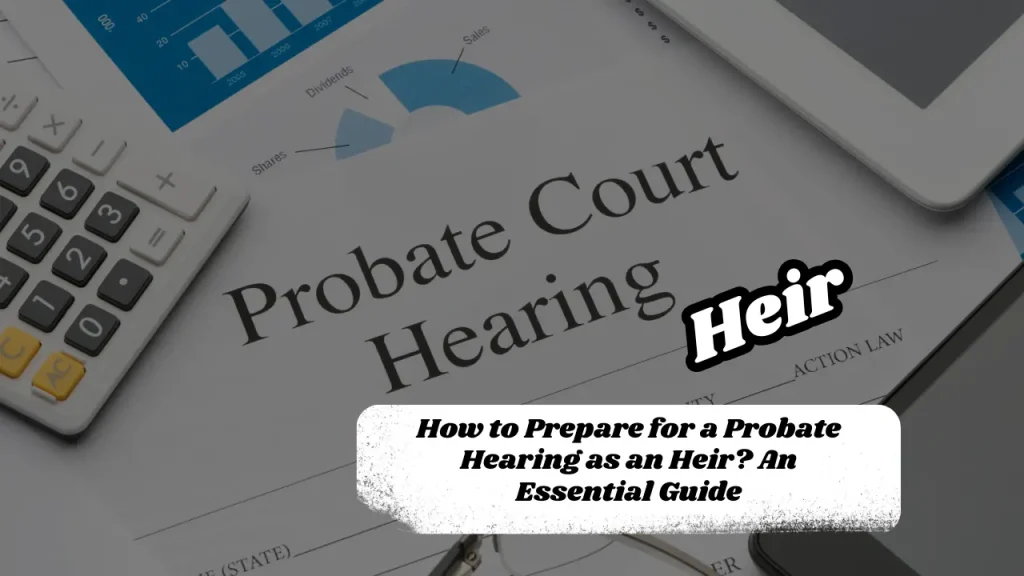How to Prepare for a Probate Hearing as an Heir? An Essential Guide
Did you know? Over 68% of Americans die without a will, leaving heirs to untangle messy intestacy laws—and fewer than 1 in 4 heirs understand how to prove their legal right to inherit. This guide cuts through the confusion, offering state-specific strategies, legal codes, and expert tips to protect your inheritance.
Your Role as an Heir
An heir is distinct from a beneficiary. Beneficiaries are named in a will, while heirs inherit by law if there’s no will (intestate) or if the will doesn’t cover all assets. For example, if your parent dies without a will, you’re an heir under state intestacy laws, typically prioritizing spouses, children, then parents or siblings (Uniform Probate Code). Your involvement in a probate hearing depends on:
- Will Validation: Ensuring the will is legitimate if one exists.
- Disputes: Contesting the will or executor’s actions if they affect your share.
- Intestacy: Confirming your inheritance if there’s no will.
Heirs often attend the initial hearing (to appoint an executor) or later ones (to address disputes or distribution), making preparation essential.
Step-by-Step Preparation Guide
Here’s how to prepare effectively, laid out clearly for you:
Step 1: Confirm Your Status as a Legal Heir
Heirs inherit only if there’s no will (intestate succession). To prove your claim:
- File a Petition to Determine Heirship (e.g., Texas Estates Code § 202) if not already done by the court.
- Submit proof of kinship:
- Birth/death certificates.
- Marriage licenses (for spouses).
- DNA tests or sworn affidavits from relatives (if documents are lost).
Example: In Iowa, parents are excluded as heirs if the deceased has children (Iowa Code § 633.219).
Step 2: Master Your State’s Intestacy Laws
Each state prioritizes heirs differently. Key examples:
| State | Who Inherits? | Legal Code |
| California | Spouse → Children → Parents → Siblings | Probate Code § 6400 |
| Florida | Spouse gets 100% if no descendants exist | Florida Statutes § 732.101 |
| Pennsylvania | Children split 50% if a spouse survives | 20 Pa.C.S. § 2101 |
Critical Tip: Non-probate assets (e.g., joint bank accounts) bypass intestacy laws. Verify if the estate includes such assets.
Step 3: Gather Evidence for the Hearing
Heirs must prove two things:
- Their relationship to the deceased.
- The estate’s assets are valid and complete.
Documents to bring:
- Certified death certificate.
- Family tree chart (for distant relatives).
- Appraisals of property, jewelry, or collectibles.
- Bank statements showing undisclosed accounts.
If kinship is disputed: Hire a certified genealogist (used in 12% of cases).
Related article for you:
How to Prepare for a Probate Hearing as an Executor or Administrator?

Step 4: Challenge Common Issues
Undervalued or Hidden Assets
- Request a reappraisal of real estate or businesses.
- File a Petition for Surcharge (e.g., UPC § 3-712) if the executor mismanages assets.
Incorrect Debt Claims
- Contest creditor claims filed after deadlines (e.g., Florida’s 90-day window).
- Argue inflated medical bills or personal loans with no paper trail.
Digital Assets
- Use the Revised Uniform Fiduciary Access to Digital Assets Act (RUFADAA) to access:
- Cryptocurrency wallets (e.g., Bitcoin).
- Royalties from unpublished works.
- Social media or PayPal funds.
Step 5: Prepare for Post-Hearing Steps
- Pay Inheritance Taxes (If Applicable):
- States with inheritance taxes: PA, NE, IA, KY, MD, NJ.
- Rates range from 1% (NE) to 18% (PA for non-lineal heirs).
- Claim Your Share:
- For cash: Request a direct transfer.
- For property: File a Deed of Distribution (e.g., California Probate Code § 13109).
- Dispute Unfair Outcomes:
- File a motion to vacate the probate order within 30–90 days (varies by state).
Mistakes Heirs Must Avoid
- Assuming “Automatic” Rights: You must legally prove heirship—even as a child.
- Missing Deadlines: Late filings forfeit claims (e.g., Texas’s 2-year limit to contest distributions).
- Ignoring Taxes: Unpaid inheritance taxes incur penalties up to 25%.
- Overlooking Digital Assets: $10B in crypto remains unclaimed due to poor awareness.
- Trusting Verbal Promises: Only court-approved distributions are binding.
FAQs: What Heirs Need to Know
What if I’m not named in the will but should inherit?
If intestacy applies to uncovered assets, you’re still an heir. Prove your relation and file a claim within the state’s deadline.
Can I attend all hearings?
Yes, probate hearings are public. Attend to stay informed, especially if you suspect mismanagement.
What if the executor ignores me?
Request updates in writing. If ignored, petition the court to compel action or replace the executor.
How long until I get my inheritance?
Typically 6 months to 2 years, depending on disputes or estate size. Track progress to avoid delays.
Where to Get Help
- State Probate Courts: Download free heirship forms (e.g., Texas Law Help).
- Genealogists: Board-certified experts at BCG.
- Tax Attorneys: Navigate state-specific laws (e.g., PA Inheritance Tax Guide).
Final Thoughts
Don’t let probate catch you off guard. Start preparing today—confirm your heir status, gather evidence, and track the process. With only 32% of estates having wills, your proactive steps can secure your inheritance and peace of mind. Contact the executor or court now for updates, and consult a lawyer if disputes loom. Act swiftly to honor your loved one’s legacy and claim what’s yours.
About the Author

Sarah Klein, JD, is an experienced estate planning attorney who has helped clients with wills, trusts, powers of attorney, and probate matters. At All About Lawyer, she simplifies complex estate laws so families can protect their assets, plan ahead, and avoid legal headaches during life’s most sensitive moments.
Read more about Sarah
